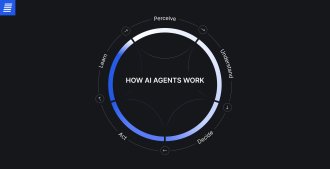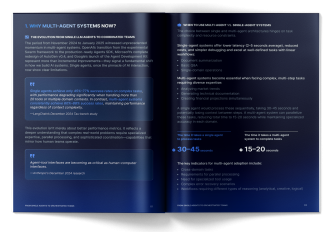
Contact us
Our team would love to hear from you.

In this article, we’ll dive into the essence of AI agents, highlight their key capabilities and use cases, and share our experience in GenAI development.
AI agents are designed to perform a wide range of tasks without constant human oversight using available tools like web searches and APIs. Leveraging the capabilities of large language models (LLMs), AI agents can understand, reason, and act to achieve specific goals. The creative and communicative elements of agents are powered by GenAI, allowing them to write reports or emails, generate dialogue or summaries, or even create designs and code.
Agentic AI solutions can be single- or multiagent depending on the number of agents, scope of tasks, and complexity. While single-agent systems consist of one agent that performs tasks and makes decisions independently, all aimed at a specific goal, multiagent systems (MASs) comprise ecosystems of AI agents collaborating toward shared objectives.
AI agent capabilities range from task execution to complex problem-solving and decision-making. These assistants can adapt to context, learn from experience and self-improve, provide personalized responses, and interact with the world through messages or even robot arms. Researchers predict that by 2028, 33% of enterprise software applications will integrate AI agents.


The efficient operation of AI agents depends on several core capabilities, which generally fall into the following categories.
AI agents gather, interpret, and process different types of data, including text, video, audio, and images. They can understand human language input using natural language understanding (NLU) and convert it into text, processing information in real time.
In AI agents, reasoning is defined as the ability to analyze information within specific contexts and make decisions based on perception, logic, and memory. A multistep reasoning approach allows agents to break down complex tasks into small steps, making the process more manageable.
Agents also use a multistep approach in planning. An AI agent can prioritize and establish a sequence of steps for task completion and implement these steps without human intervention to achieve a specific goal.
Autonomous task execution is an inherent feature of advanced AI agents, which perform tasks and make decisions independently and can operate in dynamic environments. This means they can adapt to changes and improve using iterative feedback techniques and dynamic learning—acquiring new knowledge or skills from data, experience, and interactions with other systems and humans, and adapting to their environment.
Agentic systems can interact with each other, other systems, and humans to fulfil tasks. Communication allows them to share data, make more informed decisions, and refine over time.
The following AI agent use cases showcase the role this technology plays in specific domains.
The primary role of AI agents is to significantly enhance patient care and slash administrative burden through automation, clinical decision support, and virtual health services. These solutions can analyze medical history, monitor patients, provide personalized health advice, and help with complex tasks like diagnostics or research. A survey of healthcare workers found that respondents expect AI agents to reduce manual administrative tasks and streamline care by 33%.
In the financial sector, AI agents deliver advanced capabilities such as personalized investment strategies, financial forecasting, and portfolio management. Their ability to perform algorithmic trading and assess creditworthiness makes them invaluable assets in modern financial ecosystems.
E-commerce and retail businesses benefit from AI agents through enhanced customer service. These systems offer advanced personalization by analyzing customer behavior and preferences. They also generate recommendations tailored to individual users, optimize supply chains, improve inventory management, and streamline marketing efforts through cross-selling and up-selling strategies.
Overall, customer service greatly benefits from this technology. Recent research predicts that by 2029, agentic AI will independently handle 80% of routine customer service inquiries without human intervention.
Educational AI agents create personalized learning paths, analyze student performance, and offer dynamic feedback. Through a comprehensive analysis of students’ performance, AI agents can suggest specific resources or additional exercises to support students and provide them with tailored learning experiences.
HR also benefits from AI implementation. AI-powered agents take on complex tasks, assisting HR specialists with candidate screening through candidate suitability evaluation and in-depth resume analysis, conducting interactive interviews, monitoring employee engagement, and even detecting burnout risk.
The entertainment industry uses AI agents for advanced personalized recommendations. These assistants track viewing habits; offer custom playlists, shows, and articles; and refine these suggestions. Agentic AI systems support creators by generating ideas, enabling real-time localization and dubbing, and powering game characters like non-player characters (NPCs) that learn from and adapt to player behavior.
Agentic AI systems can perform various activities to ensure compliance with relevant laws and regulations. AI agents assist businesses across various sectors by monitoring regulations, interpreting complex rules, detecting risks, and supporting compliance audits, helping prevent legal issues and maintain an effective compliance strategy.
Acting as collaborators, AI agents handle multiple tasks across the data science pipeline, from data collection to explaining insights and process automation. They gather data from different sources, clean and process it, generate reports highlighting trends and anomalies, recommend or create new relevant features for data science models, and more. For data scientists, this saves time and facilitates smarter decision-making.
This use case can save individuals’ time and significantly ease cognitive strain. AI agents, when designed as personal assistants, can manage calendars and schedules, prioritize tasks, set reminders, filter emails, and draft replies. They can also help with online shopping and booking, create personal fitness and nutrition plans, and even customize routine processes through smart home control (e.g., “Good morning” triggers opening blinds and providing weather forecasts).


If you plan to use AI agents, there are a few important things to keep in mind. Their autonomous operation can raise safety and bias concerns, which can be addressed by restricting access to essential data and incorporating human oversight, especially for high-stakes decisions. Here’s a breakdown of common challenges and solutions.
Built on LLMs, AI agents can generate inaccurate or fabricated information, which can be dangerous, especially in domains where factually correct data is critical, such as healthcare and finance. This problem is often the result of inadequate or biased training data.
To prevent hallucinations, AI models should be trained on relevant, limited data. Fact-checking pipelines and human-in-the-loop (HITL) oversight are crucial, along with using specific templates to guide model responses.
When AI agents don’t fully capture human intent, they may perform tasks they weren’t designed for or misinterpret goals, leading to unexpected behavior or even harm.
Companies can mitigate this problem by defining goals precisely and including HITL systems, allowing humans to intervene and control agents. Reinforcement learning with human feedback (RLHF) helps align LLMs with nuanced objectives, teaching them through examples.
AI agents often handle vast amounts of sensitive data, especially in fields like healthcare and finance, making them vulnerable to security threats like unauthorized access, data breaches, and cyberattacks. To ensure user adoption of these systems, data protection is crucial.
The key to secure AI agents is regulatory industry standards and requirements, such as GDPR, CCPA, and HIPAA. They provide companies with clear guidelines, best practices, and recommendations on handling sensitive data, ensuring control, security, and compliance.
Some agentic AI errors are related to unfair or discriminatory representation of certain groups of people. This often happens due to biased training data and flawed assumptions in algorithms and can be dangerous because it amplifies existing inequalities and institutionalizes injustice.
Dealing with bias in agentic AI systems requires using inclusive and representative training data, implementing regular audits and feedback loops, and involving diverse development teams. It’s crucial to establish ethical guidelines and transparent policies, controlling how AI systems are trained, tested, and used.
Implementing AI agents requires significant resources, including high-quality data, high-performance hardware, skilled engineers, initial investment, operational costs, and maintenance overheads.
Businesses can adopt several practices to reduce expenses and manage resources effectively. First, it’s important to partner with an experienced AI development company, which is usually cheaper and quicker than building a full in-house team. Outsourced experts not only help you kick-start your agentic AI project, they create a custom roadmap for the entire process, find suitable tools for your domain and requirements, and provide post-launch support.

The EffectiveSoft team delivers custom AI development services designed to tackle modern challenges and align with real business needs. One of our latest projects involved developing a voice assistant powered by GenAI agents and integrating it into our client’s application for Tesla.
Kilowatts Co. developed an infotainment application for Tesla. The app is designed to help drivers find charging stations and order from nearby stores and restaurants along their route. However, manual input distracted drivers, posing safety risks. To address this challenge, the client wanted to integrate a GenAI-powered voice assistant and turned to our team for our expertise in AI projects.
Our engineers built a voice assistant with real-time voice streaming and processing and integrated it into the Kilowatts app. Powered by GPT-4o-Realtime LLM and NLP techniques, the voice assistant supports function calling, creates appropriate responses and executes commands, understands contexts and indirect requests, enables hands-free voice interactions, and more.


We equipped the solution with the following key features:
1. Order creation
With the help of the voice assistant, Tesla drivers can search for stores and restaurants and make orders.
2. Navigation
The assistant creates efficient routes that are sent to the vehicle’s navigation system. It can also navigate drivers to the nearest charging stations and amenities.
3. Battery level control
The GenAI-powered voice assistant controls the battery level, helping optimize routes and making energy consumption more efficient.
4. Proactive suggestions
The voice assistant adapts to changing road conditions and the driver’s preferences and offers proactive suggestions like recommending charging stations.
By incorporating a GenAI-enabled voice assistant into the Kilowatts app, we gave Tesla drivers an AI companion that engages with them and fulfills their requests, improving road safety. Reach out to our team to learn more about our AI expertise and launch your project.
GenAI-enabled systems offer modern businesses a wide range of opportunities, from tailored experiences to personal assistance. AI agents act independently to meet companies’ specific needs and achieve certain goals. Whether you already have a concept in mind or are just beginning to explore the realm of agentic AI solutions, contact our expert team to clarify your vision and bring your idea to life.


Yes, AI agents can be implemented within existing business systems, enhancing them with features like intelligent recommendations, predictive analytics, and more. To learn more about the process, reach out to our team. EffectiveSoft’s engineers guarantee seamless and smooth integration of agentic AI solutions into your current infrastructure.
Since AI systems involve using sensitive data like company or customer information, security is paramount. EffectiveSoft’s engineers adhere to core security guidelines and follow best practices to ensure data privacy and security, including data encryption, role-based access control, and audit logs and monitoring. The systems we build also comply with legal regulations like GDPR, HIPAA, EU AI Act, and Colorado AI Act.
Ongoing support and maintenance are crucial to ensure the system performs smoothly and evolves in lockstep with your business. The EffectiveSoft team provides maintenance services, addressing emerging issues and refining your AI solution in response to stakeholder feedback and changing trends.
Can’t find the answer you are looking for?
Contact us and we will get in touch with you shortly.
Our team would love to hear from you.
Fill out the form, and we’ve got you covered.
What happens next?
San Diego, California
4445 Eastgate Mall, Suite 200
92121, 1-800-288-9659
San Francisco, California
50 California St #1500
94111, 1-800-288-9659
Pittsburgh, Pennsylvania
One Oxford Centre, 500 Grant St Suite 2900
15219, 1-800-288-9659
Durham, North Carolina
RTP Meridian, 2530 Meridian Pkwy Suite 300
27713, 1-800-288-9659
San Jose, Costa Rica
C. 118B, Trejos Montealegre
10203, 1-800-288-9659